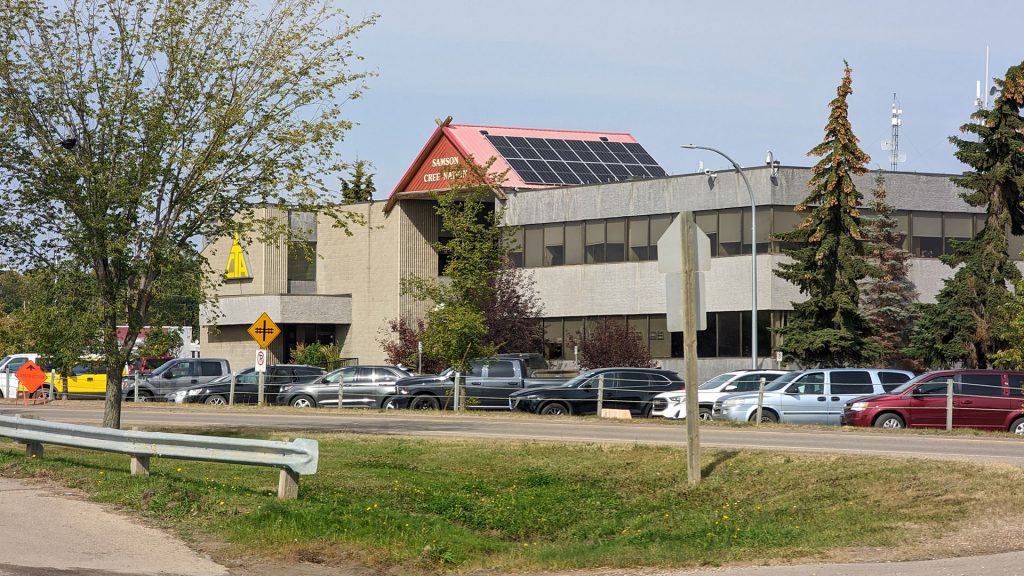
Samson Cree Nation is south of Edmonton. Photo: Chris Stewart/APTN.
Two Indigenous politicians in Alberta say the province needs to reconsider the collection of race-based data for people who interact with police.
“We reiterate the need for a comprehensive approach to fixing the structural problems in policing in this province,” said Jodi Calahoo Stonehouse and Brooks Arcand-Paul in a statement posted on Facebook Wednesday. “We stand with our colleagues who have called on the UCP to begin collecting race-based data.”
Calahoo Stonehouse and Arcand-Paul said they also want to see the government take another look at proposed anti-racism legislation that it voted down in 2022.
The politicians’ call comes after Wetaskiwin RCMP shot and killed Hoss Lightning, 15, in that town in the early morning hours of Aug. 30. The boy was from the nearby Samson Cree Nation, home to some 7,000 people, according to the 2021 Census. Wetaskiwan, where the shooting occurred is a much larger centre, just 20 km away.
In an interview with APTN News, Arcand-Paul, who is Cree from Alexander First Nation, said he knows firsthand how the family is feeling.
“Being in a colonial institution like the legislature, our work is our trauma, it is trying to prevent our people from dying.It is incredibly frustrating because we entered into this space to make those changes,” Arcand-Paul said. “But, we end up finding is there’s so much work that needs to be done by non-Indigenous people and that we are just here to try and facilitate that work.
“I think the work we need to do as Nihiyiw people-as Indigenous people, is to continue working with our families with that healing and that grieving process.”
Lightning’s family is holding a wake and other sacred ceremonies for Hoss, according to a member of the community. The family has asked for privacy as it comes to terms with the loss, but plan to make a statement after the grieving process is over.
Lightning was the subject of a missing persons case on Aug. 7 and Ponoka RCMP issued a release.
The Alberta Serious Incident Response Team (ASIRT) issued an update on its investigation Thursday. It said a lone officer of the Wetaskiwin detachment responded to the 911 call from Hoss and that interactions with the boy were recorded on video.
“The youth and the officer spoke about the situation and the youth handed over a machete and knife that he had in his possession,” the ASIRT release said. “The officer determined that the youth was at risk and attempted to apprehend the youth and search him as well as his backpack.
“While initially co-operative, the youth fled. The officer followed in his police vehicle and was joined by other officers who were assisting on the call. These officers also had their in-car video system activated, which captured the incident as it unfolded,” the statement said.
“The officers approached and got out of their vehicles. At this point a confrontation occurred and two officers discharged their firearms.” The release didn’t say what led to the shooting.
ASIRT said it had been provided with the video from the RCMP as well as all relevant communication from officers.
The release said no further information would be released publicly by ASIRT. It said in the update its mandate is to objectively investigate incidents involving Alberta’s police that have resulted in serious injury or death as well as serious or sensitive allegations of police misconduct.
On Tuesday, a chief from a neighbouring community called for the officers involved to step down immediately.
RCMP media relations said Wednesday, the officers responsible have been assigned to non-operational roles while the ASIRT investigation is underway.
While Arcand-Paul wouldn’t comment on whether the officers should step down, he said he wants the ASIRT investigation to move quickly.
“Justice is the most important thing that should happen in this case and every case moving forward, and we would just want ASIRT to move effectively and expeditiously so that the Samson Cree Nation and the family of Hoss Lightning can have some answers that they so desperately need right now,” Arcand-Paul said.
As for how to prevent similar tragedies in the future, Arcand-Paul says it requires education and training.
“Particularly the traumas of residential school that our people still work through to this day. That training requires police and the entire criminal justice system which includes the Crown prosecution service to undertake training to understand the lived realities but also to look at systemic racism and make those necessary changes within each of those systems to reflect the lived realities of Indigenous people today.”
In 2024 alone, ASIRT has laid charges against police in five separate investigations ranging from falsifying records to assault and sexual assault. It’s not known if the cases involved racially marginalized people.
One of the things both Arcand-Paul and Jodi Callahoo Stonehouse are asking is for the UCP government to re-consider Bill 204, an anti-racism bill it tossed out in 2022. The bill would allow for the collection of race-based data, allowing a clearer picture of how racialized people are treated within the justice and other systems in Alberta.
“There is a lot of work we need to do together to move forward in a good way.”










